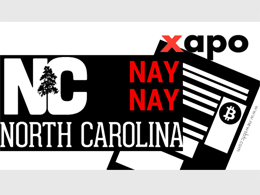
North Carolina Governor Signs Bitcoin Bill Into Law
North Carolina Governor Pat McCrory signed 16 bills into law today, one of which was House Bill 289, which expands the state’s Money Transmitters Act to cover activities related to bitcoin and other blockchain-based digital currencies. Introduced in 2015, the passage of the law represents the fruition of more than a year of engagement between members of the US blockchain and digital currency industry and local regulators. Though the bill has not been without criticism, in interviews with CoinDesk, prominent advocacy groups largely voiced support for the measure as a step forward for the....
Related News
A legislative bill that would cover bitcoin and digital currency related business activities has advanced in the North Carolina Senate. According to the The Associated Press, the Senate Commerce Committee gave its stamp of approval to SB 680, which was originally filed in March. The bill passed in the North Carolina House of Representatives by a wide majority of 117-1 in May. As noted by a spokesperson for the North Carolina's Commissioner of Banks at the time, the bill - which amends the state's Money Transmitters Act - covers any activity "involving a personal, family or household....
North Carolina Gov. Pat McCrory has signed a law that defines “virtual currency” and clarifies what activity triggers licensure. The Chamber of Digital Commerce views the measure as a historical moment for state regulation of virtual currencies and blockchain technology. The ratification of the bill, also known as the North Carolina Money Transmitter Act, follows 16 months of deliberations between the chamber, the state’s General Assembly and the North Carolina Commissioner of Banks. The General Assembly approved the bill last month, CCN reported. Law Defines ‘Virtual Currency’. The law....
The North Carolina Senate Commerce Committee has agreed to support a House Bill drafted by North Carolina's banking commissioner regarding money transmission. The bill, titled "AN ACT TO ENACT THE NORTH CAROLINA MONEY TRANSMITTERS ACT AS 3 REQUESTED BY THE OFFICE OF THE NORTH CAROLINA COMMISSIONER OF 4 BANKS," states that money transmission includes maintaining control of virtual currency on behalf of others, and that the "online-only money" [bitcoin] is converted to cash using digital currency exchanges and the holder keeps it stored online. The bill passed the House back in May and is in....
Following the advance of North Carolina's revamped Money Transmitters' Act earlier this month, bitcoin services provider Xapo announced that it will no longer be operating in the state. The company cited state-level regulation as the main factor in their decision. The North Carolina Senate has already passed the bill covering bitcoin services regulation and is pending approval of the state's governor. Upon this, the bill would mandate minimum net worth requirement of $250,000 for applicants. Businesses would also be required to post a surety bond of $150,000, an amount subject to change....
Following a majority vote of the North Carolina Senate, the General Assembly of the state has now approved the amendment of a statutory article – the North Carolina Money Transmitters Act. The move will see the term “virtual currency” added to the existing law. Bitcoin exchanges and other industry companies in North Carolina will now be mandated to obtain a money transmitter license following a vote by members of the North Carolina Senate. In May 2016, North Carolina state’s House of Representatives overwhelmingly voted in a 117-to-1 vote, seeking the update before the recent approval from....





